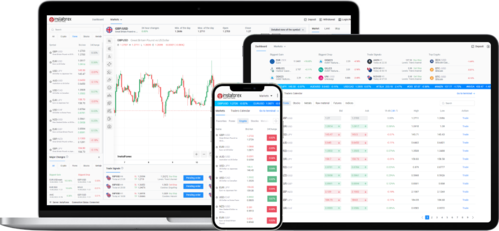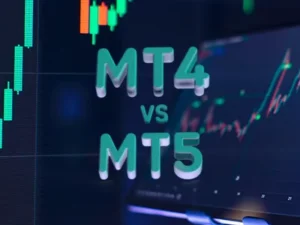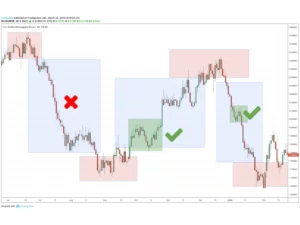Forex trading in India operates under strict laws set by the Reserve Bank of India (RBI) and the Securities and Exchange Board of India (SEBI). The goal of these regulations is to protect investors and prevent illegal foreign exchange transactions. Indian residents can legally trade forex only through authorized brokers registered with SEBI and only in currency pairs that include the Indian Rupee. This includes INR pairs such as USD/INR, EUR/INR, GBP/INR, and JPY/INR traded on recognized exchanges like NSE, BSE, and MCX-SX.
Trading with offshore brokers or using international platforms that offer cross-currency pairs (like EUR/USD or GBP/USD) is not allowed for Indian citizens. Such activities fall under the Foreign Exchange Management Act (FEMA) and can lead to penalties. Beginners must understand these boundaries before trading online. Staying within the rules not only keeps your funds safe but also helps avoid legal trouble. Learning to trade responsibly through regulated Indian brokers ensures that your investments remain protected under Indian law.
Legal Framework of Forex Trading in India
The RBI regulates foreign exchange transactions under FEMA, 1999, while SEBI oversees market practices to ensure transparency. Both authorities aim to prevent currency speculation that could impact the economy.
Only four INR-based pairs are approved for legal forex trading in India — USD/INR, EUR/INR, GBP/INR, and JPY/INR. Any other pair must be traded only if specifically permitted by the RBI.
Prohibited Forex Trading Practices
India has strict rules for forex trading to protect investors and maintain control over cross-border capital flow. Any activity that involves trading foreign currencies outside the supervision of SEBI or RBI is considered illegal under the Foreign Exchange Management Act (FEMA). Many new traders fall into traps set by offshore platforms that promise high leverage, quick profits, and “tax-free” earnings — but these claims often lead to frozen accounts or legal trouble. Understanding what’s prohibited helps you stay compliant and avoid unnecessary risks.
Trading through unregistered or international brokers that accept Indian users is strictly prohibited. These platforms are not authorized by SEBI or RBI and operate outside Indian jurisdiction, meaning your money is not legally protected. Many offshore brokers use aggressive marketing to attract Indian traders with offers like 1:1000 leverage or USD deposit bonuses. However, sending money abroad for trading violates FEMA regulations. If authorities track such transactions, they can issue notices, freeze bank accounts, or impose penalties up to ₹10 lakh or more.
Authorized Forex Platforms in India
Forex trading in India is permitted only through authorized exchanges such as NSE, BSE, and MCX-SX, all regulated by SEBI to ensure transparent pricing, proper liquidity, and investor protection. Traders must operate only through SEBI-registered brokers like Zerodha, Upstox, ICICI Direct, or HDFC Securities, which provide direct access to these exchanges. These brokers follow strict compliance rules under RBI and SEBI supervision, ensuring funds are handled securely and trades remain within legal limits. Before depositing money, traders should verify the broker’s SEBI registration number on the official website. Trading only INR-based pairs such as USD/INR, EUR/INR, GBP/INR, and JPY/INR through these licensed platforms keeps transactions safe, legal, and traceable under Indian financial laws..
Legal Documents and KYC Requirements
Proper documentation and identity verification are mandatory before trading forex in India. This ensures transparency and helps regulators track legitimate transactions. Brokers follow RBI and SEBI norms to verify every client and prevent unauthorized access or money laundering. Completing KYC once allows traders to access multiple financial instruments under the same verified account.
Documents Required
To open a forex trading account, traders must complete full KYC verification with valid government-issued documents. This process verifies identity, address, and banking details for security and compliance.
| Document Type | Purpose | Example/Notes |
|---|---|---|
| PAN Card | Confirms tax identity | Mandatory for all traders |
| Aadhaar Card | Confirms address and personal details | Linked with PAN |
| Bank Statement or Cancelled Cheque | Verifies bank account ownership | Must match registered name |
| Passport or Voter ID (Optional) | Secondary ID proof | Used if Aadhaar not available |
| Recent Utility Bill (Optional) | Address verification | Not older than 3 months |
The broker validates all documents before account activation. Incorrect or mismatched details can delay or block verification. Always ensure that your name and date of birth match across documents to prevent compliance issues.
Account Funding Rules
All deposits and withdrawals must be processed through Indian bank accounts in INR only. Using international e-wallets or foreign payment processors like Skrill, Neteller, or PayPal is not permitted for forex trading under Indian law. Funds must move directly between your bank and the registered broker’s account. This keeps transactions transparent and traceable under FEMA and RBI monitoring. Traders should also avoid third-party transfers or cash deposits, as they can trigger compliance checks.
Taxation on Forex Income
Understanding how forex profits are taxed helps avoid penalties during income tax filing.
How Forex Income Is Taxed
Forex profits are treated as speculative income if trades are frequent and short-term, such as intraday or weekly transactions. These are taxed under regular income tax slabs depending on annual earnings. For traders who treat forex as a business activity, profits may be filed under “Business Income,” allowing expense deductions like broker fees and internet costs.
Filing Forex Taxes
Traders must maintain detailed records of all transactions, including profit and loss statements, broker invoices, and contract notes. This information is needed during ITR filing and for potential audits. Always declare trading income even if profits are small — undeclared earnings may invite scrutiny from tax authorities.

Quick Tax Checklist for Forex Traders:
- Maintain broker P&L and trade summary for the full financial year.
- Report all realized profits under speculative or business income.
- Include trading expenses for accurate calculation.
- Pay advance tax if profits exceed ₹10,000 in a financial year.
- File ITR-3 or ITR-4, depending on trading volume and business structure.
Proper KYC, transparent fund movement, and timely tax filing keep forex trading fully compliant with Indian financial regulations and protect traders from legal issues.
Trading safely within Indian law protects your funds and helps you build a sustainable trading career. Following government-approved channels ensures your money remains secure and that your trades are legally recognized. Every trader should verify their broker’s registration and stay updated on RBI notifications about new rules or warnings against unregulated entities.
Follow Licensed Brokers Only
Always trade through SEBI-registered Indian brokers that are directly connected to recognized exchanges like NSE, BSE, or MCX-SX. These brokers must follow strict compliance rules and maintain transparent reporting systems. Trading through them guarantees accurate price feeds, verified order execution, and legal protection under Indian law.
Avoid Unregulated Apps
Many offshore or mobile-based apps target Indian users by promising unrealistic profits or high leverage. Such apps are not licensed to operate in India and often disappear with client funds after a few months. Always check the broker’s SEBI registration number and verify it on the official SEBI website before opening an account.
Checklist for Safe Forex Trading in India:
- Verify broker registration on SEBI’s website before depositing money.
- Trade only INR-based currency pairs approved by the RBI.
- Avoid foreign platforms or apps offering non-INR pairs.
- Never send funds abroad through online wallets or crypto transfers.
- Read all risk disclosure documents before starting.
- Keep records of all trades, deposits, and withdrawals for tax compliance.
- Use official Indian bank accounts for all financial transactions.
- Stay alert for RBI and SEBI circulars about banned or fake brokers.
Following these simple steps ensures that your forex trading remains completely legal, transparent, and protected within India’s financial system

Building a Legal Forex Strategy
Staying within approved INR-based currency pairs is the first rule for undertaking forex trading in India. These include USD/INR, EUR/INR, GBP/INR, and JPY/INR, all traded on regulated exchanges like the NSE and BSE. These pairs are highly liquid, have transparent pricing, and provide officially fed data monitored by SEBI. The trading of these pairs also secures your funds against scams and illegal risks across offshore centers. New entrants should start with USD/INR since it has the most trading volume and the smallest spreads, therefore making it easier to understand how currency price movements work. You monitor RBI circulars to stay updated with any new pair added to the permitted list.
Trade with a Plan You should have a proper trading plan. Pre-define entry and exit levels; use stop-loss orders, and leverage not exceeding 1:20 to save your balance. Do not make emotional trades based on news or announcements about policy changes by the RBI, as the market could show extreme volatility. Always back-test your strategy on demo accounts before going live. Consistency, discipline, and proper record keeping are required for building confidence. Also, following the updates about the circulars from SEBI and RBI keeps your trading in tune with the current law. Legitimate Forex trading is about steady progress, with control over the risk involved, rather than pursuit of quick profits or high leverage.
FAQ
Is Forex trading legal in India?
Yes, but only through SEBI-registered brokers and on Indian exchanges using INR-based pairs like USD/INR, EUR/INR, GBP/INR, and JPY/INR.



